NURS 6035 - Case Study: Therapeutic Engagement in Mental Health
VerifiedAdded on 2023/06/18
|8
|2241
|444
Case Study
AI Summary
This case study examines the therapeutic engagement of Donna, a 32-year-old woman experiencing postpartum depression. The chosen interventions include cognitive behavior therapy (CBT), support groups, and psychoeducation. CBT aims to address negative thoughts and promote bonding with her baby. Mindfulness and behavioral therapies were used to manage negative emotions, improve sleeping and eating habits, and prevent future relapses. Ethical considerations, such as patient confidentiality and informed consent, were prioritized. The therapist used feedback to improve the effectiveness of the therapy. The assessment concludes that various therapeutic interventions can effectively treat mental illness, highlighting the importance of selecting the most appropriate therapy and fostering a strong therapist-patient relationship. Desklib offers similar solved assignments for students.
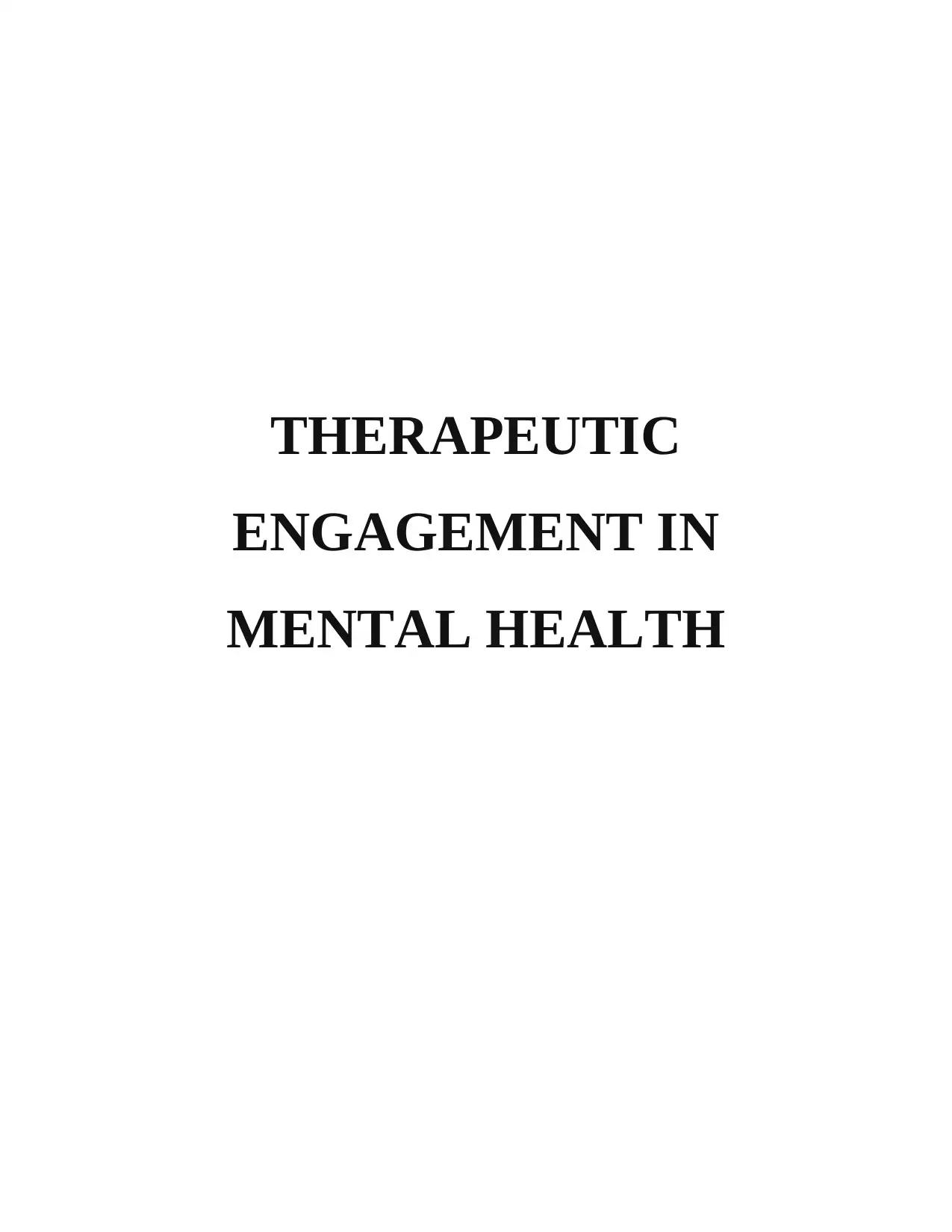
THERAPEUTIC
ENGAGEMENT IN
MENTAL HEALTH
ENGAGEMENT IN
MENTAL HEALTH
Paraphrase This Document
Need a fresh take? Get an instant paraphrase of this document with our AI Paraphraser
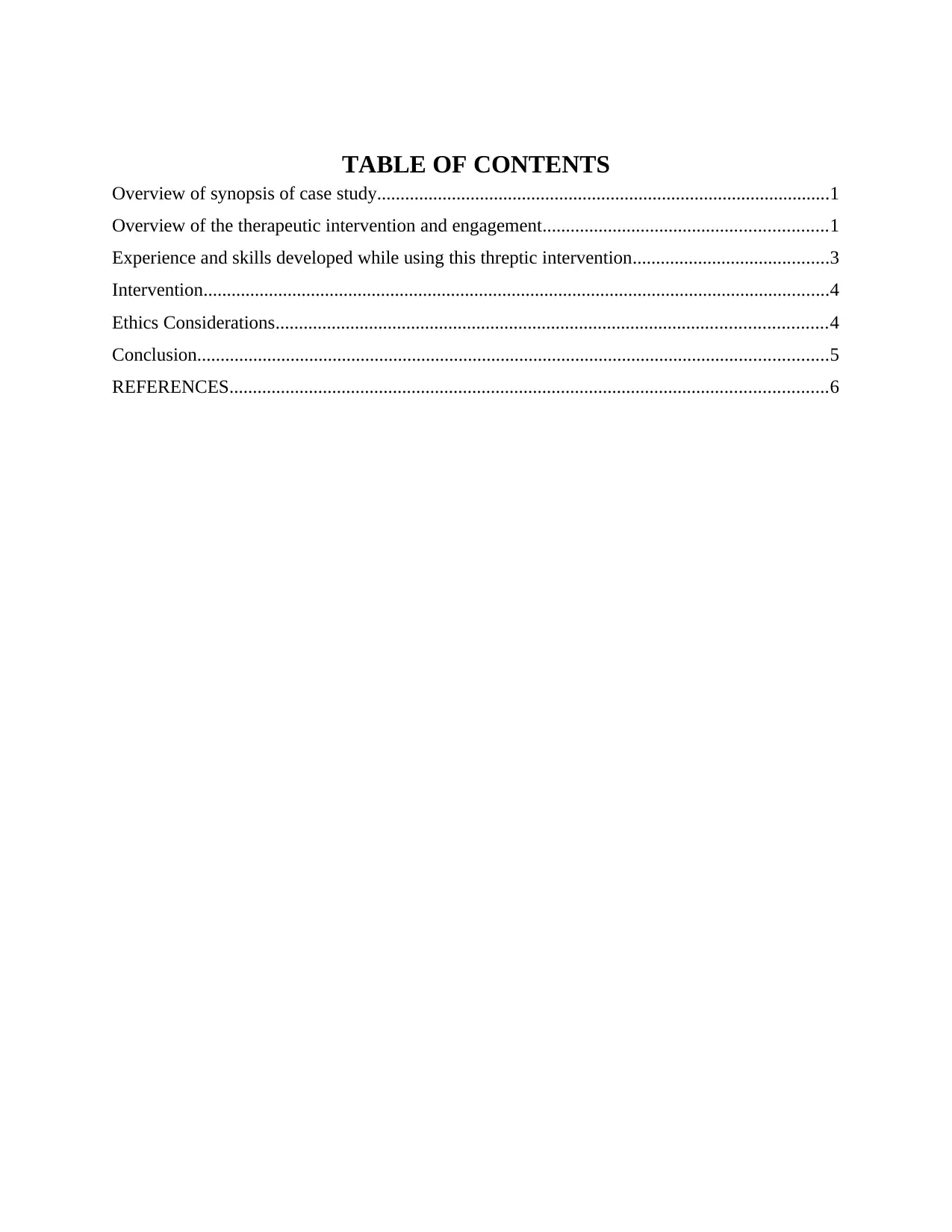
TABLE OF CONTENTS
Overview of synopsis of case study.................................................................................................1
Overview of the therapeutic intervention and engagement.............................................................1
Experience and skills developed while using this threptic intervention..........................................3
Intervention......................................................................................................................................4
Ethics Considerations......................................................................................................................4
Conclusion.......................................................................................................................................5
REFERENCES................................................................................................................................6
Overview of synopsis of case study.................................................................................................1
Overview of the therapeutic intervention and engagement.............................................................1
Experience and skills developed while using this threptic intervention..........................................3
Intervention......................................................................................................................................4
Ethics Considerations......................................................................................................................4
Conclusion.......................................................................................................................................5
REFERENCES................................................................................................................................6
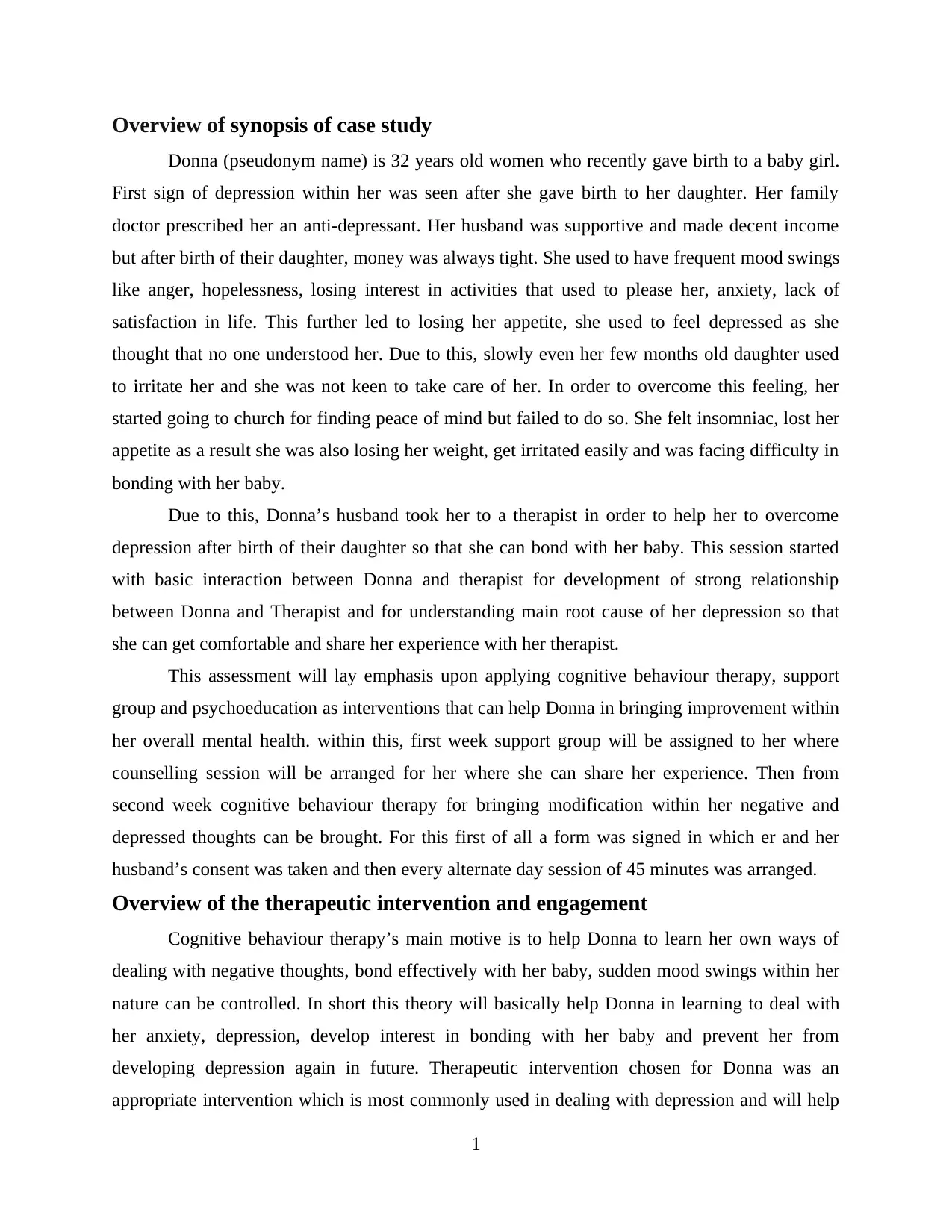
Overview of synopsis of case study
Donna (pseudonym name) is 32 years old women who recently gave birth to a baby girl.
First sign of depression within her was seen after she gave birth to her daughter. Her family
doctor prescribed her an anti-depressant. Her husband was supportive and made decent income
but after birth of their daughter, money was always tight. She used to have frequent mood swings
like anger, hopelessness, losing interest in activities that used to please her, anxiety, lack of
satisfaction in life. This further led to losing her appetite, she used to feel depressed as she
thought that no one understood her. Due to this, slowly even her few months old daughter used
to irritate her and she was not keen to take care of her. In order to overcome this feeling, her
started going to church for finding peace of mind but failed to do so. She felt insomniac, lost her
appetite as a result she was also losing her weight, get irritated easily and was facing difficulty in
bonding with her baby.
Due to this, Donna’s husband took her to a therapist in order to help her to overcome
depression after birth of their daughter so that she can bond with her baby. This session started
with basic interaction between Donna and therapist for development of strong relationship
between Donna and Therapist and for understanding main root cause of her depression so that
she can get comfortable and share her experience with her therapist.
This assessment will lay emphasis upon applying cognitive behaviour therapy, support
group and psychoeducation as interventions that can help Donna in bringing improvement within
her overall mental health. within this, first week support group will be assigned to her where
counselling session will be arranged for her where she can share her experience. Then from
second week cognitive behaviour therapy for bringing modification within her negative and
depressed thoughts can be brought. For this first of all a form was signed in which er and her
husband’s consent was taken and then every alternate day session of 45 minutes was arranged.
Overview of the therapeutic intervention and engagement
Cognitive behaviour therapy’s main motive is to help Donna to learn her own ways of
dealing with negative thoughts, bond effectively with her baby, sudden mood swings within her
nature can be controlled. In short this theory will basically help Donna in learning to deal with
her anxiety, depression, develop interest in bonding with her baby and prevent her from
developing depression again in future. Therapeutic intervention chosen for Donna was an
appropriate intervention which is most commonly used in dealing with depression and will help
1
Donna (pseudonym name) is 32 years old women who recently gave birth to a baby girl.
First sign of depression within her was seen after she gave birth to her daughter. Her family
doctor prescribed her an anti-depressant. Her husband was supportive and made decent income
but after birth of their daughter, money was always tight. She used to have frequent mood swings
like anger, hopelessness, losing interest in activities that used to please her, anxiety, lack of
satisfaction in life. This further led to losing her appetite, she used to feel depressed as she
thought that no one understood her. Due to this, slowly even her few months old daughter used
to irritate her and she was not keen to take care of her. In order to overcome this feeling, her
started going to church for finding peace of mind but failed to do so. She felt insomniac, lost her
appetite as a result she was also losing her weight, get irritated easily and was facing difficulty in
bonding with her baby.
Due to this, Donna’s husband took her to a therapist in order to help her to overcome
depression after birth of their daughter so that she can bond with her baby. This session started
with basic interaction between Donna and therapist for development of strong relationship
between Donna and Therapist and for understanding main root cause of her depression so that
she can get comfortable and share her experience with her therapist.
This assessment will lay emphasis upon applying cognitive behaviour therapy, support
group and psychoeducation as interventions that can help Donna in bringing improvement within
her overall mental health. within this, first week support group will be assigned to her where
counselling session will be arranged for her where she can share her experience. Then from
second week cognitive behaviour therapy for bringing modification within her negative and
depressed thoughts can be brought. For this first of all a form was signed in which er and her
husband’s consent was taken and then every alternate day session of 45 minutes was arranged.
Overview of the therapeutic intervention and engagement
Cognitive behaviour therapy’s main motive is to help Donna to learn her own ways of
dealing with negative thoughts, bond effectively with her baby, sudden mood swings within her
nature can be controlled. In short this theory will basically help Donna in learning to deal with
her anxiety, depression, develop interest in bonding with her baby and prevent her from
developing depression again in future. Therapeutic intervention chosen for Donna was an
appropriate intervention which is most commonly used in dealing with depression and will help
1
⊘ This is a preview!⊘
Do you want full access?
Subscribe today to unlock all pages.

Trusted by 1+ million students worldwide
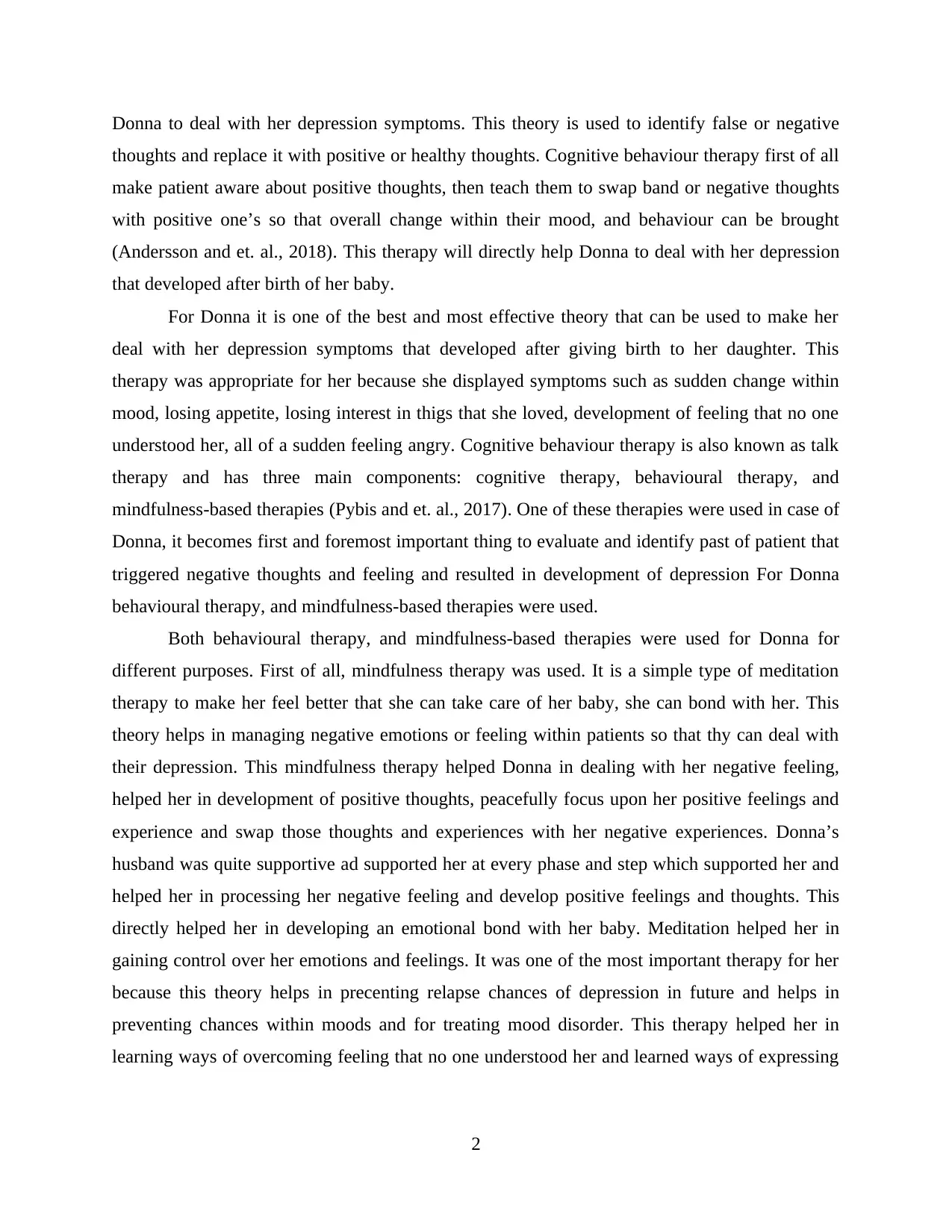
Donna to deal with her depression symptoms. This theory is used to identify false or negative
thoughts and replace it with positive or healthy thoughts. Cognitive behaviour therapy first of all
make patient aware about positive thoughts, then teach them to swap band or negative thoughts
with positive one’s so that overall change within their mood, and behaviour can be brought
(Andersson and et. al., 2018). This therapy will directly help Donna to deal with her depression
that developed after birth of her baby.
For Donna it is one of the best and most effective theory that can be used to make her
deal with her depression symptoms that developed after giving birth to her daughter. This
therapy was appropriate for her because she displayed symptoms such as sudden change within
mood, losing appetite, losing interest in thigs that she loved, development of feeling that no one
understood her, all of a sudden feeling angry. Cognitive behaviour therapy is also known as talk
therapy and has three main components: cognitive therapy, behavioural therapy, and
mindfulness-based therapies (Pybis and et. al., 2017). One of these therapies were used in case of
Donna, it becomes first and foremost important thing to evaluate and identify past of patient that
triggered negative thoughts and feeling and resulted in development of depression For Donna
behavioural therapy, and mindfulness-based therapies were used.
Both behavioural therapy, and mindfulness-based therapies were used for Donna for
different purposes. First of all, mindfulness therapy was used. It is a simple type of meditation
therapy to make her feel better that she can take care of her baby, she can bond with her. This
theory helps in managing negative emotions or feeling within patients so that thy can deal with
their depression. This mindfulness therapy helped Donna in dealing with her negative feeling,
helped her in development of positive thoughts, peacefully focus upon her positive feelings and
experience and swap those thoughts and experiences with her negative experiences. Donna’s
husband was quite supportive ad supported her at every phase and step which supported her and
helped her in processing her negative feeling and develop positive feelings and thoughts. This
directly helped her in developing an emotional bond with her baby. Meditation helped her in
gaining control over her emotions and feelings. It was one of the most important therapy for her
because this theory helps in precenting relapse chances of depression in future and helps in
preventing chances within moods and for treating mood disorder. This therapy helped her in
learning ways of overcoming feeling that no one understood her and learned ways of expressing
2
thoughts and replace it with positive or healthy thoughts. Cognitive behaviour therapy first of all
make patient aware about positive thoughts, then teach them to swap band or negative thoughts
with positive one’s so that overall change within their mood, and behaviour can be brought
(Andersson and et. al., 2018). This therapy will directly help Donna to deal with her depression
that developed after birth of her baby.
For Donna it is one of the best and most effective theory that can be used to make her
deal with her depression symptoms that developed after giving birth to her daughter. This
therapy was appropriate for her because she displayed symptoms such as sudden change within
mood, losing appetite, losing interest in thigs that she loved, development of feeling that no one
understood her, all of a sudden feeling angry. Cognitive behaviour therapy is also known as talk
therapy and has three main components: cognitive therapy, behavioural therapy, and
mindfulness-based therapies (Pybis and et. al., 2017). One of these therapies were used in case of
Donna, it becomes first and foremost important thing to evaluate and identify past of patient that
triggered negative thoughts and feeling and resulted in development of depression For Donna
behavioural therapy, and mindfulness-based therapies were used.
Both behavioural therapy, and mindfulness-based therapies were used for Donna for
different purposes. First of all, mindfulness therapy was used. It is a simple type of meditation
therapy to make her feel better that she can take care of her baby, she can bond with her. This
theory helps in managing negative emotions or feeling within patients so that thy can deal with
their depression. This mindfulness therapy helped Donna in dealing with her negative feeling,
helped her in development of positive thoughts, peacefully focus upon her positive feelings and
experience and swap those thoughts and experiences with her negative experiences. Donna’s
husband was quite supportive ad supported her at every phase and step which supported her and
helped her in processing her negative feeling and develop positive feelings and thoughts. This
directly helped her in developing an emotional bond with her baby. Meditation helped her in
gaining control over her emotions and feelings. It was one of the most important therapy for her
because this theory helps in precenting relapse chances of depression in future and helps in
preventing chances within moods and for treating mood disorder. This therapy helped her in
learning ways of overcoming feeling that no one understood her and learned ways of expressing
2
Paraphrase This Document
Need a fresh take? Get an instant paraphrase of this document with our AI Paraphraser
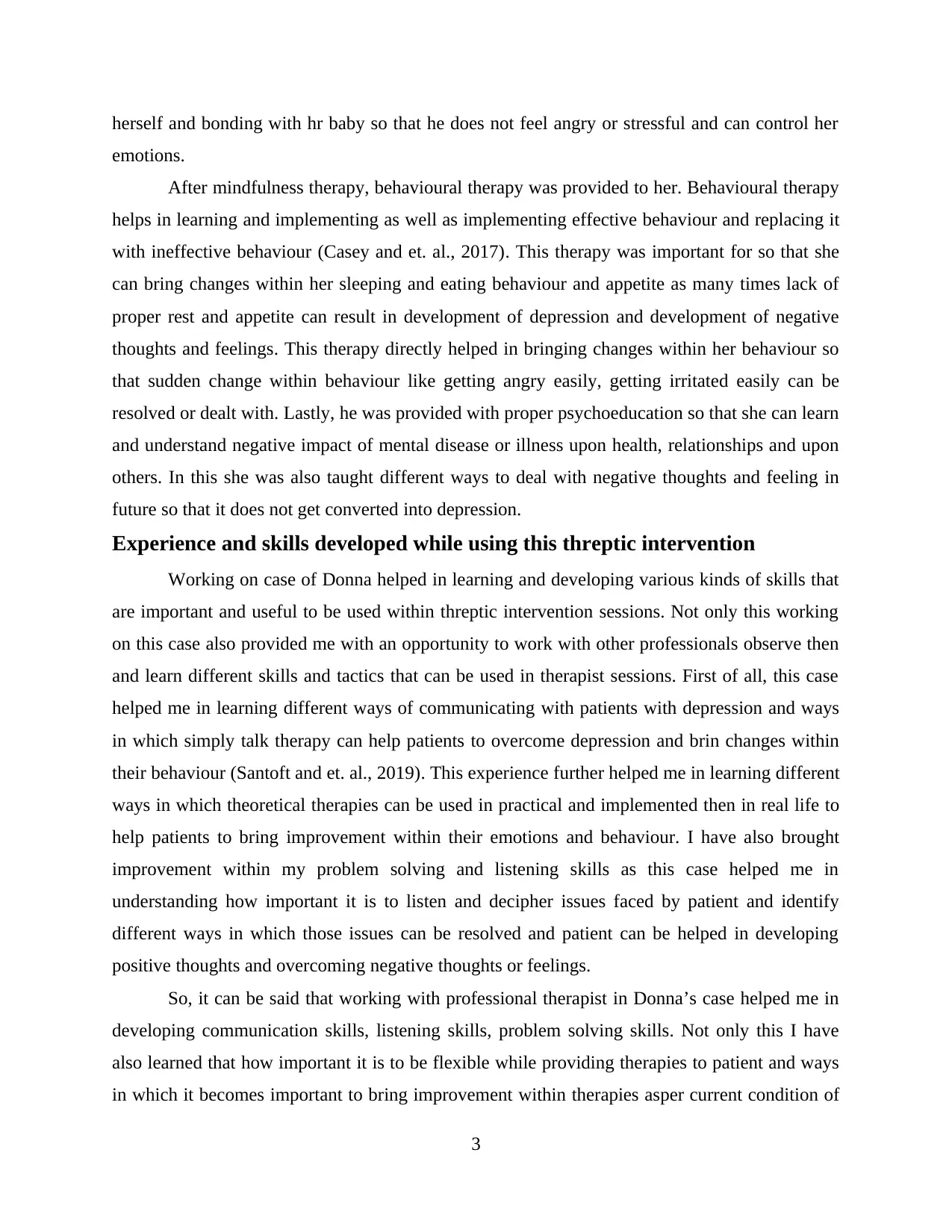
herself and bonding with hr baby so that he does not feel angry or stressful and can control her
emotions.
After mindfulness therapy, behavioural therapy was provided to her. Behavioural therapy
helps in learning and implementing as well as implementing effective behaviour and replacing it
with ineffective behaviour (Casey and et. al., 2017). This therapy was important for so that she
can bring changes within her sleeping and eating behaviour and appetite as many times lack of
proper rest and appetite can result in development of depression and development of negative
thoughts and feelings. This therapy directly helped in bringing changes within her behaviour so
that sudden change within behaviour like getting angry easily, getting irritated easily can be
resolved or dealt with. Lastly, he was provided with proper psychoeducation so that she can learn
and understand negative impact of mental disease or illness upon health, relationships and upon
others. In this she was also taught different ways to deal with negative thoughts and feeling in
future so that it does not get converted into depression.
Experience and skills developed while using this threptic intervention
Working on case of Donna helped in learning and developing various kinds of skills that
are important and useful to be used within threptic intervention sessions. Not only this working
on this case also provided me with an opportunity to work with other professionals observe then
and learn different skills and tactics that can be used in therapist sessions. First of all, this case
helped me in learning different ways of communicating with patients with depression and ways
in which simply talk therapy can help patients to overcome depression and brin changes within
their behaviour (Santoft and et. al., 2019). This experience further helped me in learning different
ways in which theoretical therapies can be used in practical and implemented then in real life to
help patients to bring improvement within their emotions and behaviour. I have also brought
improvement within my problem solving and listening skills as this case helped me in
understanding how important it is to listen and decipher issues faced by patient and identify
different ways in which those issues can be resolved and patient can be helped in developing
positive thoughts and overcoming negative thoughts or feelings.
So, it can be said that working with professional therapist in Donna’s case helped me in
developing communication skills, listening skills, problem solving skills. Not only this I have
also learned that how important it is to be flexible while providing therapies to patient and ways
in which it becomes important to bring improvement within therapies asper current condition of
3
emotions.
After mindfulness therapy, behavioural therapy was provided to her. Behavioural therapy
helps in learning and implementing as well as implementing effective behaviour and replacing it
with ineffective behaviour (Casey and et. al., 2017). This therapy was important for so that she
can bring changes within her sleeping and eating behaviour and appetite as many times lack of
proper rest and appetite can result in development of depression and development of negative
thoughts and feelings. This therapy directly helped in bringing changes within her behaviour so
that sudden change within behaviour like getting angry easily, getting irritated easily can be
resolved or dealt with. Lastly, he was provided with proper psychoeducation so that she can learn
and understand negative impact of mental disease or illness upon health, relationships and upon
others. In this she was also taught different ways to deal with negative thoughts and feeling in
future so that it does not get converted into depression.
Experience and skills developed while using this threptic intervention
Working on case of Donna helped in learning and developing various kinds of skills that
are important and useful to be used within threptic intervention sessions. Not only this working
on this case also provided me with an opportunity to work with other professionals observe then
and learn different skills and tactics that can be used in therapist sessions. First of all, this case
helped me in learning different ways of communicating with patients with depression and ways
in which simply talk therapy can help patients to overcome depression and brin changes within
their behaviour (Santoft and et. al., 2019). This experience further helped me in learning different
ways in which theoretical therapies can be used in practical and implemented then in real life to
help patients to bring improvement within their emotions and behaviour. I have also brought
improvement within my problem solving and listening skills as this case helped me in
understanding how important it is to listen and decipher issues faced by patient and identify
different ways in which those issues can be resolved and patient can be helped in developing
positive thoughts and overcoming negative thoughts or feelings.
So, it can be said that working with professional therapist in Donna’s case helped me in
developing communication skills, listening skills, problem solving skills. Not only this I have
also learned that how important it is to be flexible while providing therapies to patient and ways
in which it becomes important to bring improvement within therapies asper current condition of
3
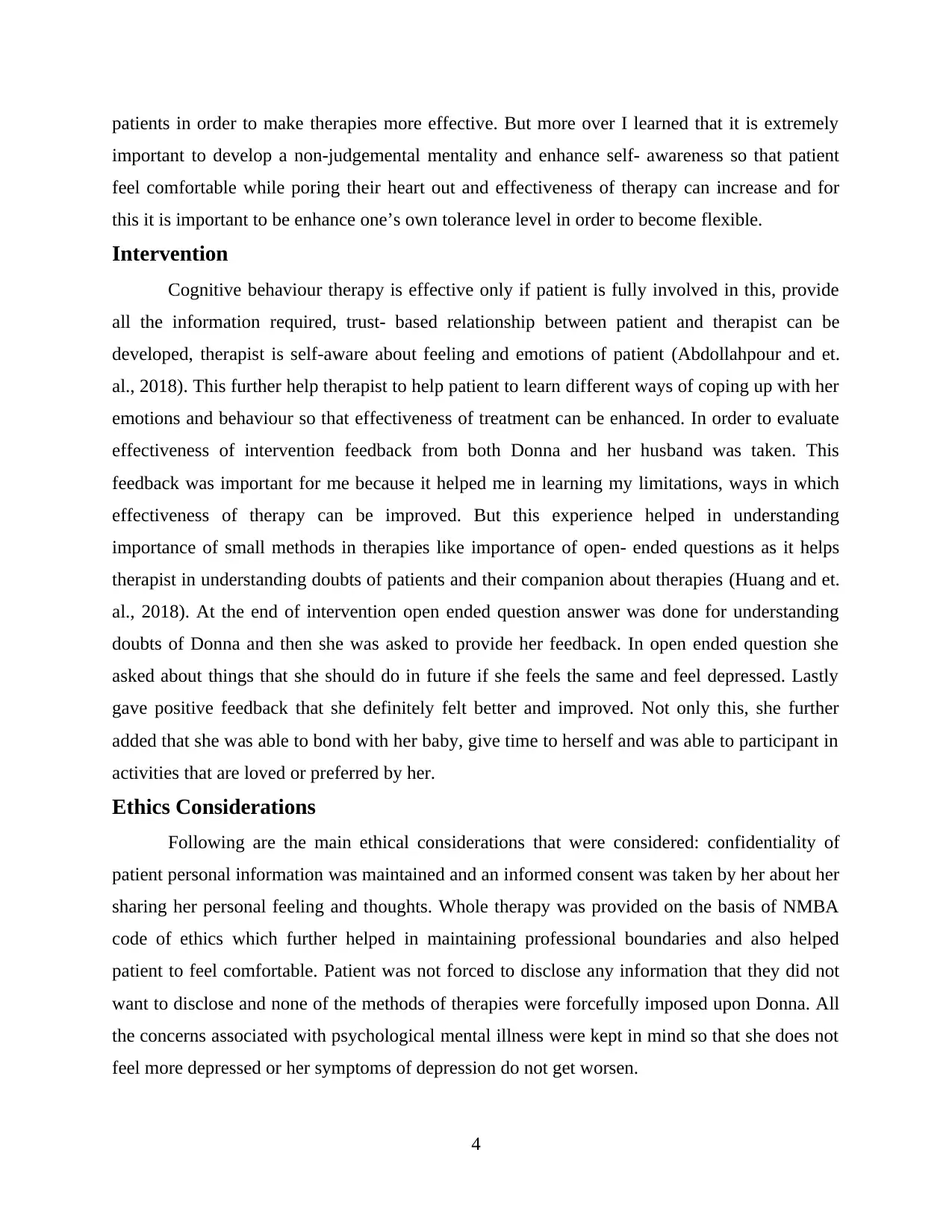
patients in order to make therapies more effective. But more over I learned that it is extremely
important to develop a non-judgemental mentality and enhance self- awareness so that patient
feel comfortable while poring their heart out and effectiveness of therapy can increase and for
this it is important to be enhance one’s own tolerance level in order to become flexible.
Intervention
Cognitive behaviour therapy is effective only if patient is fully involved in this, provide
all the information required, trust- based relationship between patient and therapist can be
developed, therapist is self-aware about feeling and emotions of patient (Abdollahpour and et.
al., 2018). This further help therapist to help patient to learn different ways of coping up with her
emotions and behaviour so that effectiveness of treatment can be enhanced. In order to evaluate
effectiveness of intervention feedback from both Donna and her husband was taken. This
feedback was important for me because it helped me in learning my limitations, ways in which
effectiveness of therapy can be improved. But this experience helped in understanding
importance of small methods in therapies like importance of open- ended questions as it helps
therapist in understanding doubts of patients and their companion about therapies (Huang and et.
al., 2018). At the end of intervention open ended question answer was done for understanding
doubts of Donna and then she was asked to provide her feedback. In open ended question she
asked about things that she should do in future if she feels the same and feel depressed. Lastly
gave positive feedback that she definitely felt better and improved. Not only this, she further
added that she was able to bond with her baby, give time to herself and was able to participant in
activities that are loved or preferred by her.
Ethics Considerations
Following are the main ethical considerations that were considered: confidentiality of
patient personal information was maintained and an informed consent was taken by her about her
sharing her personal feeling and thoughts. Whole therapy was provided on the basis of NMBA
code of ethics which further helped in maintaining professional boundaries and also helped
patient to feel comfortable. Patient was not forced to disclose any information that they did not
want to disclose and none of the methods of therapies were forcefully imposed upon Donna. All
the concerns associated with psychological mental illness were kept in mind so that she does not
feel more depressed or her symptoms of depression do not get worsen.
4
important to develop a non-judgemental mentality and enhance self- awareness so that patient
feel comfortable while poring their heart out and effectiveness of therapy can increase and for
this it is important to be enhance one’s own tolerance level in order to become flexible.
Intervention
Cognitive behaviour therapy is effective only if patient is fully involved in this, provide
all the information required, trust- based relationship between patient and therapist can be
developed, therapist is self-aware about feeling and emotions of patient (Abdollahpour and et.
al., 2018). This further help therapist to help patient to learn different ways of coping up with her
emotions and behaviour so that effectiveness of treatment can be enhanced. In order to evaluate
effectiveness of intervention feedback from both Donna and her husband was taken. This
feedback was important for me because it helped me in learning my limitations, ways in which
effectiveness of therapy can be improved. But this experience helped in understanding
importance of small methods in therapies like importance of open- ended questions as it helps
therapist in understanding doubts of patients and their companion about therapies (Huang and et.
al., 2018). At the end of intervention open ended question answer was done for understanding
doubts of Donna and then she was asked to provide her feedback. In open ended question she
asked about things that she should do in future if she feels the same and feel depressed. Lastly
gave positive feedback that she definitely felt better and improved. Not only this, she further
added that she was able to bond with her baby, give time to herself and was able to participant in
activities that are loved or preferred by her.
Ethics Considerations
Following are the main ethical considerations that were considered: confidentiality of
patient personal information was maintained and an informed consent was taken by her about her
sharing her personal feeling and thoughts. Whole therapy was provided on the basis of NMBA
code of ethics which further helped in maintaining professional boundaries and also helped
patient to feel comfortable. Patient was not forced to disclose any information that they did not
want to disclose and none of the methods of therapies were forcefully imposed upon Donna. All
the concerns associated with psychological mental illness were kept in mind so that she does not
feel more depressed or her symptoms of depression do not get worsen.
4
⊘ This is a preview!⊘
Do you want full access?
Subscribe today to unlock all pages.

Trusted by 1+ million students worldwide

Conclusion
From the above assessment it has been summarized that there are various kinds of
therapeutic intervention that can be focused upon for providing proper treatment a patient with
mental illness such as depression. It is important to understand which therapy can be used that
might be effective on patient with mental illness.
5
From the above assessment it has been summarized that there are various kinds of
therapeutic intervention that can be focused upon for providing proper treatment a patient with
mental illness such as depression. It is important to understand which therapy can be used that
might be effective on patient with mental illness.
5
Paraphrase This Document
Need a fresh take? Get an instant paraphrase of this document with our AI Paraphraser
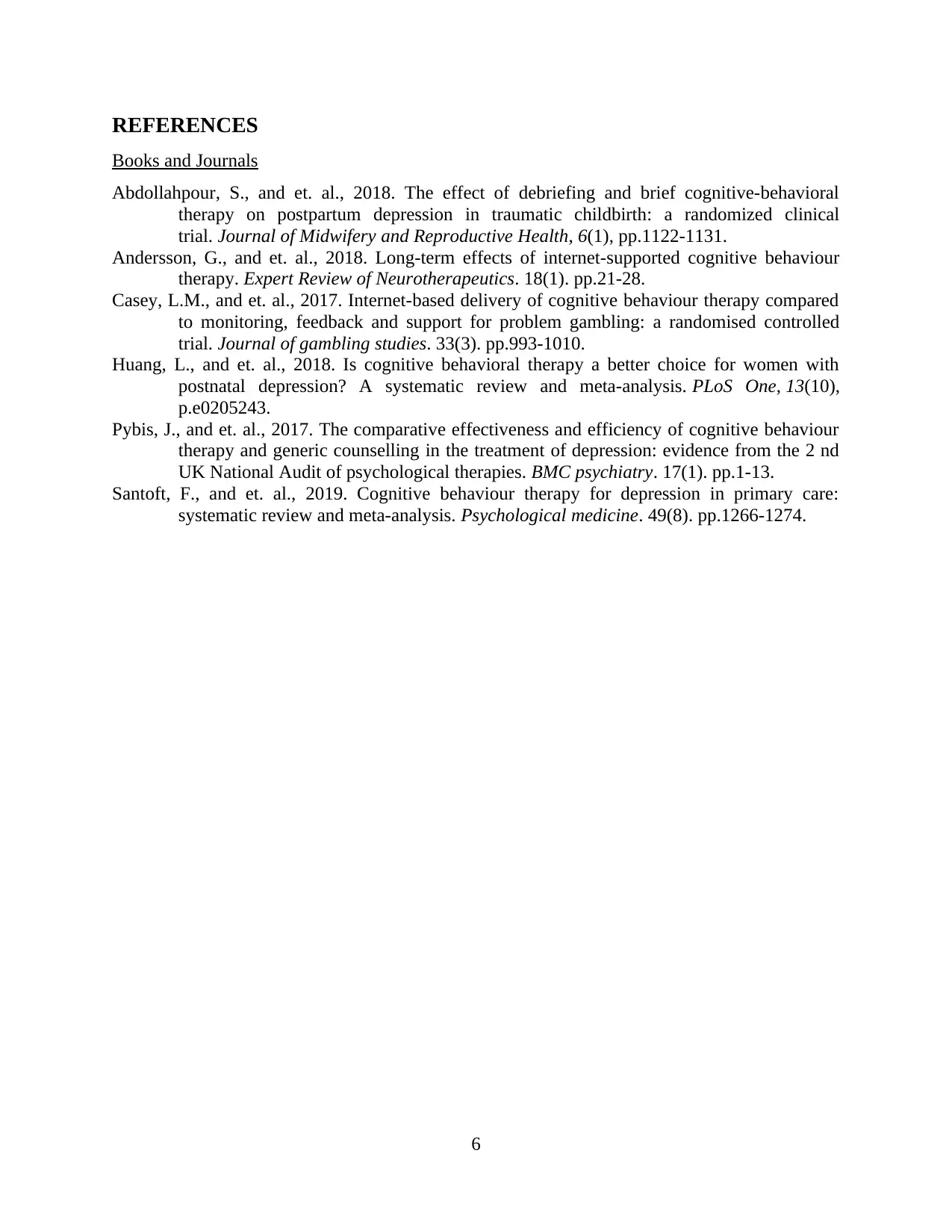
REFERENCES
Books and Journals
Abdollahpour, S., and et. al., 2018. The effect of debriefing and brief cognitive-behavioral
therapy on postpartum depression in traumatic childbirth: a randomized clinical
trial. Journal of Midwifery and Reproductive Health, 6(1), pp.1122-1131.
Andersson, G., and et. al., 2018. Long-term effects of internet-supported cognitive behaviour
therapy. Expert Review of Neurotherapeutics. 18(1). pp.21-28.
Casey, L.M., and et. al., 2017. Internet-based delivery of cognitive behaviour therapy compared
to monitoring, feedback and support for problem gambling: a randomised controlled
trial. Journal of gambling studies. 33(3). pp.993-1010.
Huang, L., and et. al., 2018. Is cognitive behavioral therapy a better choice for women with
postnatal depression? A systematic review and meta-analysis. PLoS One, 13(10),
p.e0205243.
Pybis, J., and et. al., 2017. The comparative effectiveness and efficiency of cognitive behaviour
therapy and generic counselling in the treatment of depression: evidence from the 2 nd
UK National Audit of psychological therapies. BMC psychiatry. 17(1). pp.1-13.
Santoft, F., and et. al., 2019. Cognitive behaviour therapy for depression in primary care:
systematic review and meta-analysis. Psychological medicine. 49(8). pp.1266-1274.
6
Books and Journals
Abdollahpour, S., and et. al., 2018. The effect of debriefing and brief cognitive-behavioral
therapy on postpartum depression in traumatic childbirth: a randomized clinical
trial. Journal of Midwifery and Reproductive Health, 6(1), pp.1122-1131.
Andersson, G., and et. al., 2018. Long-term effects of internet-supported cognitive behaviour
therapy. Expert Review of Neurotherapeutics. 18(1). pp.21-28.
Casey, L.M., and et. al., 2017. Internet-based delivery of cognitive behaviour therapy compared
to monitoring, feedback and support for problem gambling: a randomised controlled
trial. Journal of gambling studies. 33(3). pp.993-1010.
Huang, L., and et. al., 2018. Is cognitive behavioral therapy a better choice for women with
postnatal depression? A systematic review and meta-analysis. PLoS One, 13(10),
p.e0205243.
Pybis, J., and et. al., 2017. The comparative effectiveness and efficiency of cognitive behaviour
therapy and generic counselling in the treatment of depression: evidence from the 2 nd
UK National Audit of psychological therapies. BMC psychiatry. 17(1). pp.1-13.
Santoft, F., and et. al., 2019. Cognitive behaviour therapy for depression in primary care:
systematic review and meta-analysis. Psychological medicine. 49(8). pp.1266-1274.
6
1 out of 8
Your All-in-One AI-Powered Toolkit for Academic Success.
+13062052269
info@desklib.com
Available 24*7 on WhatsApp / Email
![[object Object]](/_next/static/media/star-bottom.7253800d.svg)
Unlock your academic potential
Copyright © 2020–2026 A2Z Services. All Rights Reserved. Developed and managed by ZUCOL.

